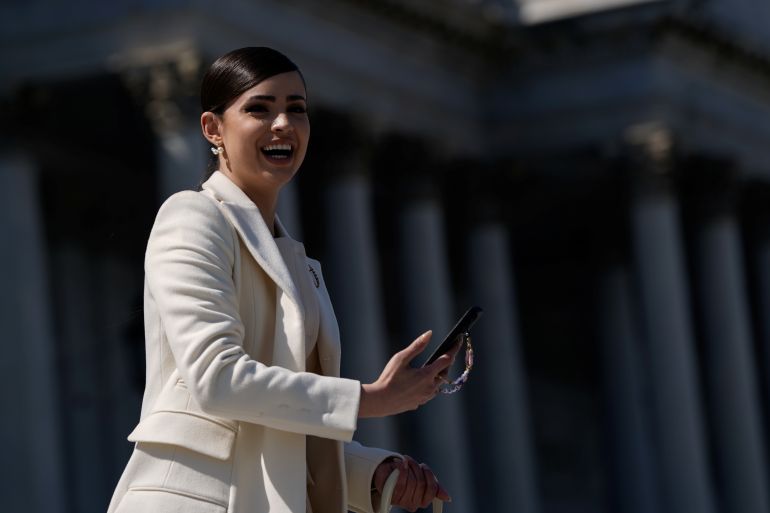Purple Hearts is a terrible film — but it gets America right
With its racist, misogynistic stereotypes, the Netflix romance unintentionally serves as a mirror to the US.

Netflix’s recently released romance Purple Hearts has been in the news for all the wrong reasons. Directed by Elizabeth Allen Rosenbaum and starring Sofia Carson and Nicholas Galitzine, the film has been watched for more than 100 million hours on the platform and is on track to join the ranks of Netflix’s most viewed content.
Yet, one has to wonder if this is because of the story or the controversies surrounding it.
Keep reading
list of 4 itemsAround the world, cinephiles say ‘meh’ to Hollywood’s Oscar nominees
Singapore’s PM defends Taylor Swift exclusivity deal amid regional grumbles
Singapore plays down payment to Taylor Swift amid grumbles from neighbours
Purple Hearts has drawn criticism for propagating disturbing racist and misogynistic stereotypes. The film’s one redeeming quality? It reflects the angry, divided reality of America and its treatment of non-white, non-male people more accurately than the filmmakers perhaps intended.
Set in Oceanside, California, the story revolves around Cassie (Carson), an aspiring singer with diabetes who is unable to foot her insulin bills, and Luke (Galitzine), a young marine about to be deployed to Iraq for the first time. The two are as different as chalk and cheese; Cassie is blue at heart, touts liberalism and rails against misogyny and racism, while Luke is all red, conservative and the quintessential “white patriot” ready to fight in the Middle East.
Their first meeting crackles with mutual contempt and dislike, and things don’t get any better subsequently, but they still agree to deceive the military by marrying each other to reap marriage benefits. It ensures Cassie total medical coverage, including insulin, and provides Luke with extra cash so he can pay off his debt to a drug dealer.
Rosenbaum claims that Purple Hearts is about promoting moderation or centrism; that two polarising individuals can come together in love to listen to and imbibe each other’s points of view. When red and blue mix together, they turn purple, hence the name of the film. However, the only change in perspective we see is on Cassie’s part.
Sample this: A group of young marines goes to a bar where they think being soldiers entitles them to star treatment. They see Cassie who isn’t interested in dating soldiers. One of the marines asks her: “So we’re good enough to fight for your ass but not good enough to touch it?” His friend (Luke) decides to try winning her over with charm (but no apology).
When Cassie responds testily, Luke lectures her on fighting for people’s rights on Twitter while soldiers like him go off to war. And as if misogyny isn’t enough, there’s a generous dose of shocking racist rhetoric in the mix too. A marine says: “This one is to life, love and hunting down some goddamn Arabs, baby!” Oh, and he pronounces “Arabs” wrong, by the way.
Rosenbaum has defended the storyline by arguing in interviews that “for characters to grow, they need to be flawed in the beginning”. Yet the only character who appears to “grow” is Cassie.
The couple doesn’t have any meaningful conversations about why they believe what they believe, so there’s no stage set for moderate views. Yet, Cassie suddenly has a change of heart, shown in her hanging the American banner from her balcony beside Pride and Black Lives Matter flags. (This, in itself, is a subconscious display of the state of the US today — that the idea of America is separate from LGBTQI and ethnic identities and rights.)
Additionally, while Cassie is a victim of America’s problematic healthcare system, Luke isn’t neglected at all. If anything, his white conservative identity allows him, a former addict in the debt of a criminal dealer, to join the Marine Corps without raising any questions. He is raring to go to war, and when he gets injured, he comes back home having been afforded top-notch treatment and a Purple Heart!
Differing political ideologies aren’t character flaws. Millions of people coexist with mild to drastic political views, many of them in family settings. On American TV, we’ve seen Diane Lockhart and Kurt McVeigh on the Emmy-winning The Good Fight, who marry each other without compromising on their Democratic and Republican ideals, and talk at length about their principles. Their portrayal is a lesson in moderation, as is the content in Madam Secretary. In Purple Hearts, by contrast, the frequent evocation of dangerous sexist and racist stereotypes, without addressing them at all, is almost propaganda-like.
Even worse? This is after the US military apparently sanitised the content to show the Marines in a better light. Given how cringeworthy most of the film is, one has to question where the American military draws the ethical and moral line among its recruits.
There’s plenty to criticise about the film. It sets out to make a political statement, which it gets very wrong. It does not tackle any of the complex socio-political issues it raises through its characters; it just leaves viewers with disturbing rhetoric that appears to be a reckless ploy to provoke controversy rather than promote conversation.
But where Purple Hearts succeeds spectacularly is that it unintentionally serves as a mirror to America today, reflecting its rampant — and disturbing — prejudices. For that reason alone, it deserves to be watched.
The views expressed in this article are the author’s own and do not necessarily reflect Al Jazeera’s editorial stance.
